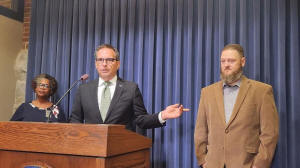Retail merchants, banks continue battle over credit card transaction
fees
 Send a link to a friend
Send a link to a friend
 [September 26, 2024]
By Jim Talamonti | The Center Square [September 26, 2024]
By Jim Talamonti | The Center Square
(The Center Square) – Businesses and banks are at odds over a pending
Illinois law banning credit card fees when customers pay for taxes and
tips.
Illinois Retail Merchants Association President and CEO Rob Karr said
recent polling shows overwhelming public support for the Interchange Fee
Prohibition Act. The law slated to take effect next July prohibits banks
and credit card companies from charging swipe fees on the state and
local sales tax and tip portion of a transaction when the consumer pays
with a credit or debit card. Financial institutions can still impose
fees on transactions using debit or credit cards for goods and services.
Karr spoke at a news conference in Springfield on Tuesday. He said the
fees charged by banks and credit card companies are unfair.
“These fees are paid by merchants who have no choice but to pass them
along to consumers, which the Justice Department said hits younger and
lower-income consumers the hardest,” Karr said.
Karr disagreed with bankers’ assertions that the law will bring chaos or
cause consumers to swipe cards twice.
“No, in fact, think about it. It’s laughable on its face. When you go to
any place that does tips, does your card get swiped twice?” Karr asked.

Pamela Frazier, president and CEO of All in One Laundry Center and
Services, said the new law means her business will no longer have to pay
credit card companies’ fees on sales taxes and tips.
“That tangible savings will allow us to assist more of the customers in
need. That includes hiring individuals from the community experiencing
homelessness, returning citizens and underserved populations,” Frazier
said.
Karr shared a poll that showed the vast majority of voters surveyed
favor the prohibition of charging fees on tax and tip transactions.
Ben Jackson of the Illinois Bankers Association and Ashley Sharp of the
Illinois Credit Union League provided The Center Square with a joint
statement on Tuesday.
[to top of second column]
|

Illinois Retail Merchants Association President and CEO Rob Karr
stands alongside Springfield-area business owners. - Greg Bishop |
The Center Square

“Today’s poll and press conference from the retailers was nothing
more than a smokescreen. The survey clearly failed to inform
consumers that this law will cause chaos every time they use a
credit or debit card, and no amount of spin from the retailers will
change that," the statement said. "Besides violating a host of
federal laws as our legal complaint makes clear, this law does
absolutely nothing for consumers. It doesn’t mean bigger tips for
workers, or that workers get to keep more of their tips. In fact, it
could incentivize people not to leave a tip at all."
The bankers and credit union league statement also said the pending
law does not raise a single dollar for the state of Illinois.
“It simply forces banks, credit unions, small businesses and
everyone at the check-out counter to navigate a needlessly complex
new system that rewards the state’s largest retail stores. No one
else in the world has adopted this approach, and for good reason,”
Jackson and Sharp stated.
The American Bankers Association, the Illinois Bankers Association,
America’s Credit Unions and the Illinois Credit Union League filed a
complaint in the U.S. District Court for the Northern District of
Illinois last month. The plaintiffs are seeking an injunction to
halt implementation of the new law while the court decides the case.
The groups said the law banning credit card fees on taxes and tips
violates multiple federal statutes and would throw the modern and
efficient payment system into chaos.
Despite the federal complaint, Karr remained optimistic about the
case.
“We’re not going to prejudge. We think we’re on very solid ground
with that. We’ll see what they do,” Karr said.
The Interchange Fee Prohibition Act is scheduled to take effect on
July 1st, 2025.
All contents © copyright 2024 Associated Press. All rights reserved |